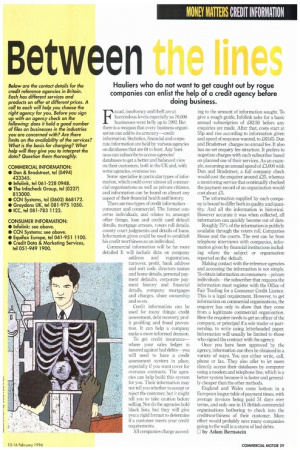etween
Page 31

If you've noticed an error in this article please click here to report it so we can fix it.
Hauliers who do not want to get caught out by rogue companies can enlist the help of a credit agency before doing business.
Fraud, insolvency and theft are at horrendous levels especially as 70,000 businesses went belly up in 1992. But there is a weapon that every business organisation can add to its armoury—credit information. Statistics, financial and corporate information are held by various agencies on databases that are fit to bust. Any business can subscribe to access agencies' databases to get a better and balanced view on their customers, both in the UK and, with some agencies, overseas too.
Some specialise in particular types of information, which could cover almost all commercial organisations as well as private citizens, and information can be found on almost any aspect of their financial health and history.
There are two types of credit informationconsumer and commercial. The former concerns individuals, and relates to, amongst other things, loan and credit card default details, mortgage arrears, voters roll details, county court judgments and details of loans. Information given could be used to establish his credit worthiness as an individual.
Commercial information will be far more detailed It will include data on company address and registration, turnover, profit, bank address and sort code, directors names and home details, personal pay ment defaults, corporate pay ment history and financial details, company mortgages and charges, share ownership and so on.
, Credit information can be used for many things: credit assessment, debt recovery profit profiling and fraud prevention. It can help a company make a more informed decision.
To get credit insurance— where your sales ledger is insured against bad debts—you will need to have a credit assessment system in place, especially if you want cover for overseas contracts. The agencies can help build this system for you. Their information may not tell you whether to accept or reject the customer, but it might tell you to take caution before selling. Nor do the agencies hold black lists, but they will give you a rigid format to determine if a customer meets your credit requirements.
All companies charge accord
ing to the amount of information sought. To give a rough guide, Infolink asks for a basic annual subscription of £82.50 before any enquiries are made. After that, costs start at 55p and rise according to information given and speed of response wanted, to £83.65. Dun and Bradstreet charges no annual fee. It also has no set enquiry fee structure. It prefers to negotiate charges with each subscriber based on planned use of their services. As an example, assuming an annual spend of £3,000 with Dun and Bradstreet, a full company check would cost the enquirer around £25, whereas a monitoring service that continually checked the payment record of an organisation would cost about £5.
The information supplied by each company is bound to differ both in quality and quantity. And all the information is historical. However accurate it was when collected, all information can quickly become out of date.
Roughly 75% of the information is publicly available through the voters roll, Companies House and the courts. The rest can be from telephone interviews with companies, information given by financial institutions including where the subject or organisation reported on the default.
Making contact with the reference agencies and accessing the information is not simple. lb obtain information on consumers—private individuals—the subscriber that requires the information must register with the Office of Fair Trading for a Consumer Credit Licence. This is a legal requirement. However, to get information on commercial organisations, the enquirer has only to show that they come from a legitimate commercial organisation. Here the enquirer needs to get an officer of the company, or principal if a sole trader or partnership, to write using letterheaded paper. Information will usually be limited to those who signed the contract with the agency.
Once you have been approved by the agency, information can then be obtained in a variety of ways. You can either write, call, phone or fax. They also offer to let users directly access their databases by computer using a modem and telephone line, which is a better system because it is faster and generally cheaper than the other methods.
England and Wales come bottom in a European league table of payment times, with average invoices being paid 51 days over terms, and only one in 15 British commercial organisations bothering to check into the creditworthiness of their customer. More effort would probably save many companies going to the wall in a storm of bad debts.
El by Adam Bernstein




















































































